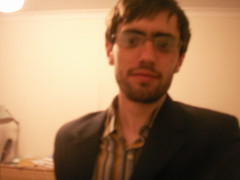hot puppies
 The whole of The Hot Puppies debut album, 'Under The Crooked Moon', is really great - arty, literate pop with nods to Blondie, Pulp and PJ Harvey - but the best song on the record, 'The Girl Who Was Too Beautiful', is just majestic, both musically and - particularly - lyrically. So I'll take a little time to admire the lyrics and the theme of the song, because I think it's quite special - a kind of short story of a song. It begins:
The whole of The Hot Puppies debut album, 'Under The Crooked Moon', is really great - arty, literate pop with nods to Blondie, Pulp and PJ Harvey - but the best song on the record, 'The Girl Who Was Too Beautiful', is just majestic, both musically and - particularly - lyrically. So I'll take a little time to admire the lyrics and the theme of the song, because I think it's quite special - a kind of short story of a song. It begins: "Dear Mariella, I am 25.
"Dear Mariella, I am 25.
I live alone.
I think I might have found love,
But I just don't know.
There's something wrong".
I'm a big fan of Mariella Frostrup and her no-nonsense relationship advice column in the Observer, so the first time I heard this song that's the bit that jumped out. That's pretty neat, I thought, a love song in the shape of a letter to an agony aunt.
The next few lines somehow somehow slipped by unnoticed for a while, but then I noticed them:
"Cause he has another love,
and she's been buried a year.
And there might be a passing resemblence,
but dear Mariella, how can I compare with the girl, with the girl, with the girl, with the girl
who was too beautiful?"
And all of a sudden the song is in a much darker place altogether. The protagonist, expertly voiced by the marvellous Bec Newman, is preocuppied with her partner's dead lover, and begins, despite the warnings of those close to her, to assume her predecessor's persona.
"And all my friends say that it's not right,
but I don't care, I'm gonna change my hair.
Cause he wants her.
And I just want somebody there."
The next verse raises the drama. The bit where Newman sings "Dear Mariellia / It's gone from bad to worse / It feels like I'm chasing a hearse / And now I'm even wearing her clothes / I feel like a ghost" is plain shocking. Worse still is to come.
"And just the other day, staring from across the street,
I think I might have seen her mother, but dear Mariella,
She didn't see me. Just a girl.
Just a girl, just a girl, just a girl who was too beautiful".
By the song's end, the by now wretched sounding Newman is almost totally subsumed, asking and threatening "would you wanna let go, like I wanna let go, and I need to let go?" and concluding, finally, "I am the girl who was too beautiful". It's a deliciously Hitchcockian theme, simultaneously dark, knowing and sexy, and brilliantly performed. The tune itself positively sizzles, bursting with tremendous melodies, keyboard riffs and it even briefly swoops into an indie-disco breakdown without breaking its stride.
Odd how so much press time has been expended on the (admittedly great) Long Blondes while the Hot Puppies are bubbling under - it was great to see Kate Jackson up near the top of the NME's supremely daft Cool List this year, but surely Bec Newman deserved a place too. Hopefully they'll be massive in 2007 - they deserve to be. Doubtless half of the blogs in my sidebar and starting to put together their yearly round-up lists, and I probably will soon too. And this is a serious contender for best single of the year.
